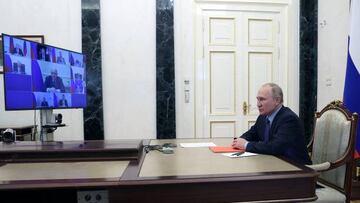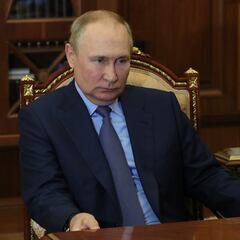Putin introduces tough new sentences for “actions of high treason”
Russia has ratified a law that makes changing sides during an armed conflict a treasonous offence, paving the way for harsher sentences for defectors.

The President of Russia, Vladimir Putin, has ratified a law that makes it a treasonous offence to change sides during an armed conflict. Although the change was not explicitly related to the ongoing Russian invasion of Ukraine, it is though that the tougher sentences are designed to discourage soldiers from defecting.
The new law modifies article 275 of the Russian Criminal Code to introduce “high treason actions” in relation to an individual changing sides. As such, those who are found guilty under the new legislation could be sentenced to up to 20 years in prison, according to information from the Interfax news agency.
Extension of criminal liability
The law functions by granting additional criminal responsibility to Russian citizens who participate in armed conflicts that “do not play in the interests of Russia,” even if there are are no other indications of treason. For those who are found guilty, sentences of between 12 and 20 years in prison are stipulated.
This regulation also includes penalties for those who are involved in the activities of overseas organizations considered “undesirable” by the Russian government. New regulations regarding crimes of espionage are also included in this new regulation, with sentences of between three and eight years for anyone convicted of cooperating with representatives of foreign governments and international organizations.
⚡️Security Service: 3 Russian-led militants from Donbas sentenced to 15 years in prison.
— The Kyiv Independent (@KyivIndependent) July 26, 2022
The Security Service of Ukraine reported that three militants from Donetsk Oblast who fought on Russia's side were found guilty of high treason.
This includes the transfer, collection, theft or storage of information for the purpose of transferring to an enemy. The actions in question will be punished with sentences of between 10 and 20 years in prison.
However there is a mechanism by which individuals could be released if they agree to cooperate with Russian authorities.
Aiding the enemy
The legislation defines an enemy as “any foreign state and international organization that opposes Russia in an armed conflict”. Calls to carry out actions against the Russian Government typically carry fines of between 100,000 and 500,000 rubles (between $1,600 and $8,400).
Anyone convicted of aiding the recruitment, entertainment and financing of mercenaries during hostilities and armed conflicts will also be sentenced with up to 18 years in prison.
Russia is plundering Sudanese riches to aid Putin's war in Ukraine -- and helping to prop up the country's military rulers https://t.co/pKZdFT1Fy8
— CNN Breaking News (@cnnbrk) July 29, 2022
Foreign Agents Act
Related stories
In addition, Putin has signed a law that expands the regulations in force on so-called “foreign agents” and broadens the ways in which an individual can be punished. New terminology describes foreign agents as: “Russian or foreign entities, public associations and foreign structures that operate without establishing a legal person regardless of their citizenship”.
However this will not affect public entities and bodies in Russia, such as state corporations, religious and business associations that have already been previously registered, according to state news agencies.


